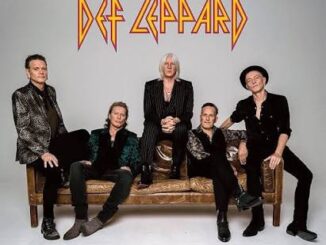Decades of Decibels: Def Leppard’s Unstoppable Journey
Let’s take a deep dive into the riveting odyssey of Def Leppard, a band whose resilience, innovation, and infectious energy have echoed through the halls of rock history for nearly half a century.
Origins and Early Ascent (1977–1981)
Def Leppard’s story begins in Sheffield, England, 1977, formed by teenagers Joe Elliott, Rick Savage, and Pete Willis. Initially dubbed “Deaf Leopard,” they soon became a foundational element of the New Wave of British Heavy Metal movement (Encyclopedia Britannica, Def Leppard Tours).
Their debut album, On Through the Night (1980), garnered modest attention. But their sophomore effort, High ‘n’ Dry (1981), produced by the meticulous Robert John “Mutt” Lange, marked a turning point. Featuring “Bringin’ On the Heartbreak”—one of the first metal videos on MTV—it laid the groundwork for their explosive rise (Encyclopedia Britannica, 8notes).
Pyromania: Igniting Global Stardom (1982–1984)
In 1982, guitarist Pete Willis was replaced by Phil Collen amid internal struggles (Encyclopedia Britannica, 8notes). The next year, Pyromania (1983) exploded onto the scene. With hits like “Photograph,” “Rock of Ages,” and “Foolin’,” plus sleek production by Lange, the album sold over 10 million copies in the U.S. alone and propelled them into worldwide fame (Musician Guide, Encyclopedia Britannica, 8notes, Reddit).
Triumph Through Tragedy (1984–1987)
On December 31, 1984, tragedy struck: drummer Rick Allen lost his left arm in a devastating car accident (Wikipedia, Musician Guide). Undeterred, Allen trained fiercely to adapt with a custom electronic kit, and by August 1986, he had returned to the stage with the band (Wikipedia, Musician Guide, Def Leppard Tours).
Amid the personal turmoil, recording pressed on, culminating in Hysteria—an album meant to push boundaries in digital production. Despite initial setbacks, it became a defining moment in pop-metal (Pitchfork, Def Leppard Tours).
Hysteria: A Monument of Pop-Metal (1987–1990)
Hysteria, released in 1987, stands as the band’s magnum opus. With masterful production, layered vocals, and sonic polish, it spawned timeless hits like “Pour Some Sugar on Me” and “Love Bites”—the latter reaching No. 1 on the Billboard Hot 100 (Pitchfork, Wikipedia, Rock Music Universe, Encyclopedia Britannica).
This album sold over 14 million copies worldwide and proved to be a cultural phenomenon (Encyclopedia Britannica, Rock Music Universe). Fans on Reddit still passionately declare its enduring power:
“Still the best rock album of all time!”
“They were stellar … still sounding great today.” (Reddit)
Honoring the Past, Embracing the Future (1991–1995)
The early ’90s yielded heartache: founding guitarist Steve Clark passed away in January 1991 due to health complications tied to addiction (Musician Guide, Reddit). The band persevered, releasing Adrenalize in 1992 as a tribute to Clark, and welcoming Vivian Campbell as his permanent replacement (Musician Guide, Def Leppard Tours).
Their following albums—Retro Active (1993) and Vault (1995)—helped solidify their legacy, with the band even achieving a Guinness Record by playing three concerts across three continents in one day in 1995 (Musician Guide, Def Leppard Tours).
A Period of Reinvention (1996–2005)
In 1996, Def Leppard released Slang, an album that diverged sharply from their signature sound, embracing a darker, alternative rock tone (Def Leppard Tours, Reddit). Fans regarded it as “criminally underrated” (Reddit).
In 1999, Euphoria marked a notable return to the band’s classic melodic style. It reached No. 11 on both US and UK charts, with the single “Promises” topping Billboard’s Mainstream Rock chart (Wikipedia).
The 2000s saw further experimentation, with the pop-leaning album X (2002), a covers album Yeah! (2006), and Songs from the Sparkle Lounge (2008) followed by extensive touring and a resurgence in popularity via MTV’s Behind the Music (Def Leppard Tours, Wikipedia).
Legacy Continues (2006–Present)
The band’s momentum carried into the 2010s and beyond. Tours like Mirror Ball: Live & More (2011) reinvigorated their fan base (Def Leppard Tours). Their self-titled album Def Leppard arrived in 2015, followed by Diamond Star Halos in 2022—a fresh studio effort after a seven-year hiatus
In 2023, they released Drastic Symphonies, a richly orchestrated reimagining of classic tracks, recorded with the Royal Philharmonic Orchestra at famed Abbey Road Studios
Throughout, they’ve stayed active live—recently announcing a 2026 Las Vegas residency at Caesars Palace
Why Def Leppard Still Matters
1. Unmatched Resilience
From Rick Allen’s comeback to navigating the passing of Steve Clark, the band has continually transformed adversity into artistry.
2. Production Trailblazers
Mutt Lange’s production pushed the creative envelope—Hysteria, in particular, was designed for the format of compact discs, illustrating their futuristic vision (Pitchfork, Wikipedia).
3. Timeless Hits
Songs like “Photograph,” “Pour Some Sugar on Me,” and “Love Bites” remain staples of rock radio and playlists everywhere.
4. Loyal Fan Connection
Whether via world-record tours or heartfelt interviews, Def Leppard continues cultivating deep emotional bonds with fans spanning generations.
5. Cultural Influence
Their blend of raw rock energy and pop polish inspired countless artists and helped define the sound of ’80s rock.
Conclusion: A Sonic Legacy That Roars On
Def Leppard’s journey is one of reinvention, resilience, and roaring success. From gritty beginnings in 1970s Sheffield to sweeping global superstardom, they’ve changed—but never lost their heartbeat.
They’ve weathered tragedy, talent transitions, and industry shifts, always reinventing their sound while staying true to their identity. Their layered, polished anthems helped shape the pop-metal genre, and every generation finds something new to love in their catalog.
As they continue performing, releasing, and inspiring—Decades of Decibels remain their legacy. Their story is far from over, and their riffs still ring loud.
Would you like to explore any specific era, album, or song more deeply? I’m happy to dive in!


Be the first to comment